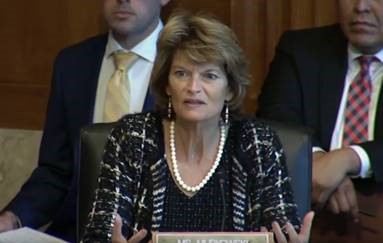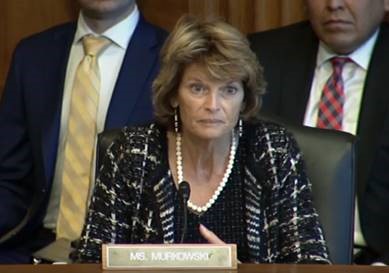Murkowski Joins Committee in Addressing Tribal Workforces
‘Reducing Red Tape While Promoting Employment and Training Opportunities in Indian Country’
U.S. Senator Lisa Murkowski (R-AK) and her colleagues on the Senate Indian Affairs Committee this week held an oversight hearing focused on the PL 477 program, an innovative and comprehensive Native employment and training program. The 477 program is unique in that it allows tribes to pool funding from various federal agencies to support projects to tackle the significant unemployment conditions that impact Native communities across the U.S. The hearing included testimony from Ralph Anderson, President and CEO of the Bristol Bay Native Association, from Dillingham, Alaska.
During the hearing, Senator Murkowski outlined the purpose of the 477 program, but noted the importance of continuing to reevaluate the program, and to incorporate improvements that are needed to make the mechanism as effective as possible.
“We all know that in far too many tribes, far too many areas in the Lower 48 and up in Alaska, you don’t have the big infrastructure that is developed that would allow you to take on a lot of unnecessary or costly administrative overhead. So when we can build efficiencies into our programs, this should be a model for us all, and I think that’s what 477 was really designed to do. So when it doesn’t do what it was designed to do, we need to ask the question why,” said Senator Murkowski. “This is too important from the perspective of ensuring that our employment and training services that are delivered by our tribes are done in the most efficient and effective way.”

Click here for video of Senator Murkowski’s opening statement.
During the hearing, Senator Murkowski questioned witness, Mr. Spike Bighorn, Acting Deputy Bureau Director for the Office of Indian Services at the Bureau of Indian Affairs, on the lack of Tribal consultation that took place in developing a Memorandum of Agreement (MOA) regarding the 477 program.
“I am all over every agency that comes to my office when they’re talking to me about their relationship with our tribes in Alaska. I say, ‘you know that consultation should not be something that you are directed to do. Consultation should be something that is inherent.’ That as an agency you go to the Tribes, you have that consultation,” said Senator Murkowski.
Senator Murkowski outlined to Mr. Bighorn her concern that the MOA does not faithfully implement the law, leading to negative impacts and delays in the 477 program. She urged Mr. Bighorn to work with his colleagues and other federal agencies that are parties to the MOA, to critically and quickly consider what modifications can be made to ensure the process in place is as efficient and as possible and to reopen the MOA to make it consistent with the law.

Click here for video of Senator Murkowski questioning witness Spike Bighorn.
Background:
- In 2017, the Senate-passed H.R. 228, the Indian Employment, Training and Related Services Consolidation Act of 2017, which was introduced in the U.S. House of Representatives by Congressman Don Young (R-AK). Senator Murkowski and Senator Dan Sullivan (R-AK) both sponsored S.91, a Senate companion bill to H.R. 228. The legislation, which was signed into law, amended Public Law 102-477 to improve and make permanent the 477 program.
- Public Law 102-477 allows federally-recognized tribes and Alaska Native entities to combine formula-funded federal grant funds into a single plan with a single budget and a single reporting system. The legislation allows for implementation of plans for the purpose of economic development, job training, welfare-to-work and tribal work experience, skill development, facilitation of employment, assisting Indian youth and adults to succeed in the workforce, and encouraging self-sufficiency.








